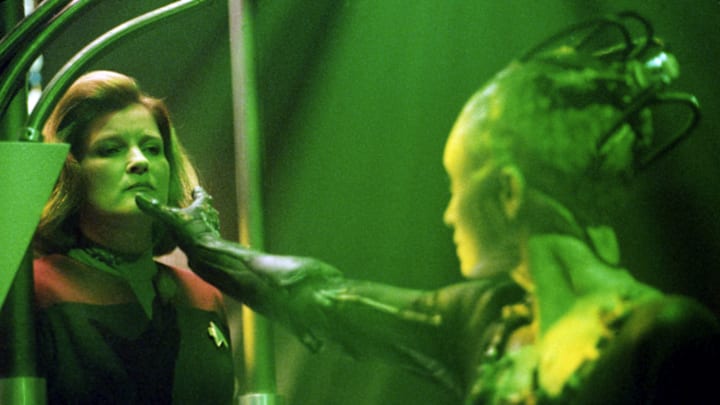Whatever happened to "V'Ger"? Where did "The Doomsday Machine" originate? How about those forehead ridged "Klingons?
All interesting questions which fans have pondered for years. Could it be these are stories best left untold? Maybe NOT knowing exactly how something came about in "Star Trek" is best left to speculation!
Let's take a closer look at on air explanations which left us "cold"... My personal favorite (to hate) would be the original series to movie/Next Generation transformation of the Klingons. In the "Enterprise" fourth season episode, "Affliction," the episode went into an overly detailed description why Klingons grew ridged foreheads. Gosh, did we really need this storyline? Gene Roddenberry, when confronted with this question after the premiere of "Star Trek: The Motion Picture", summed it up quite nicely, "They always had them." The reality was far more practical, Paramount needed "motion picture quality" make-up and not the "roar of cheap greasepaint", as depicted on tiny tube TV's (with an equally tiny television budget) from the 1960's. Let's just wish this story into the cornfield. This ungainly story grew writing horns for me almost immediately. I don't think I even watched the thing to the end.
Another example of "too much information" comes from the "Borg collective". We were introduced to one of Next Generation's most toxic villain, the Borg. Their appearence in "Q-Who?" was frightening. A decentralized and unstoppable galactic force - one which couldn't be reckoned, negotiated or even manipulated to any degree. "Surrender or die" was their mantra, putting the self-assured Federation "we'll negotiate a successful solution" on their collective, galactic heels. Guinan's warning they couldn't be stopped and "leave now while you still can" put a menacing pall on our space explorers.
However, by the fourth or fifth episodic encounter coupled with a whole motion picture dedicated to the Borg, we found their original cool disassociated, logical intellect had been compromised with a completely unnecessary contradictive "Borg queen" (remember, whenever the Borg spoke to the Enterprise, they were of many voices - suddenly - that changed with a single voice - either Borg Picard or the queen.) We can find mulitple version of Borg which also engaged in various forms of emotion and passions. Gone was the whole idea these beings could put whole planets out of commission in minutes, replaced with computer viruses and potent bombs.
Why is sequel storytelling bad?
Over exposure to the Borg premise soured and perverted the original idea. Part of the original beauty to the Borg was just how they came into being remains a mystery, and that's a good thing. Unfortunately we've also been over exposed, via "not-so-good" storyarcs to buy into some pretty annoying character flaws. In short, our Borg are just a mere shadow of what they were when we were introduced to them way back in 1985.
Let Star Trek fans figure out unresolved storylines.
Now let's look at the "flip side" to "overtelling". We mentioned the "Doomsday Machine" from the original Star Trek. We knew the thing came from outside our galaxy and it posed a real threat. Ask Commodore Decker who went off the deep end trying to deal with the emotionaless machine. How long was the Doomsday Machine wandering our galaxy? How did it survive on its long Trek from another place? Thousands or millions of years? Space is a pretty empty place.
The answer is actually pretty simple. We don't want to know. At least we don't need a dedicated Star Trek episode explaining it. If you really need an explanation, you can try a non-canon Doomsday short story in "Constellations".
While we are at it, let's talk "V'Ger", rumored to be from the Borg collective. That's great! We fans have debated this origin story for years. Does it matter if V'Ger were patched up by the Borg and sent to Earth? Of course it doesn't - especially when the Borg seemed fully, willing, and capable to send a Borg ship complete with drones to do the job first. The more you dissect the story the more you run into the Klingon ridged forehead problem. Explaining away "V'Ger's" origins weakens the original story.
J.J. Abrams once did a Ted Lecture called "The Mystery Box" which explains why we should sometimes leave well enough alone, that overexplaining always leads to disappointment. Star Trek storytelling is not exempt from that. Opening the mystery box usually is a bad idea.
